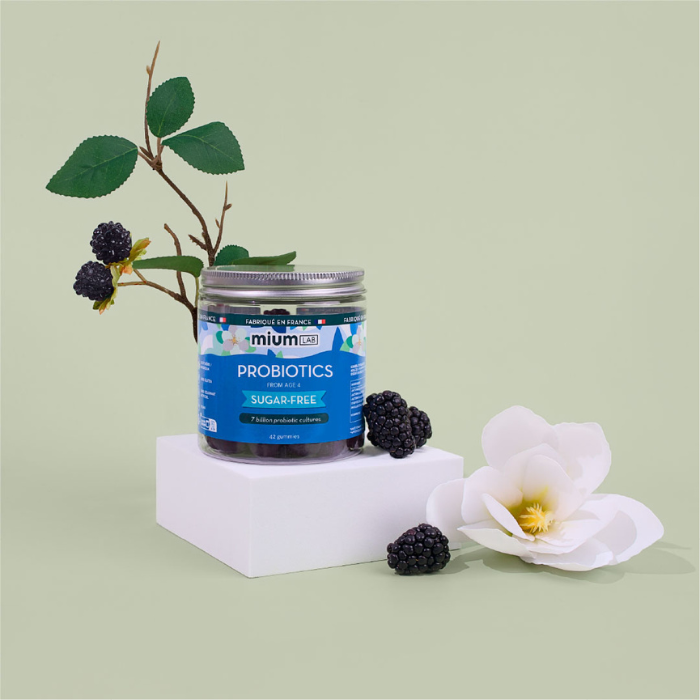Summary
What are probiotics?
The term “probiotic” comes from the Greek “pro bios”, meaning “for life”. According to the widely accepted definition, probiotics are live microorganisms which, when administered in adequate amounts, provide a health benefit to the host. These microorganisms mainly include bacteria, especially from the Lactobacillus and Bifidobacterium genera, as well as certain yeasts. They play an active role in maintaining the gut flora—also known as the gut microbiota—by balancing populations of beneficial and potentially harmful bacteria. This balance is essential for optimal digestion, vitamin synthesis, and immune system support.
History and origin of probiotics
The use of probiotics dates back thousands of years. Ancient civilisations already consumed fermented foods such as kefir, miso and sauerkraut, without understanding the underlying mechanisms. In the early 20th century, Russian microbiologist Élie Metchnikoff suggested that the longevity of certain populations was linked to their regular consumption of yoghurt containing beneficial lactic acid bacteria. His research laid the foundation for modern probiotic science and its relevance to human health.
Types of probiotics
Probiotics come in many species and strains, each with its own specific function and efficacy. The most studied are the lactobacilli (e.g. Lactobacillus rhamnosus, Lactobacillus acidophilus, Lactobacillus plantarum) and bifidobacteria (such as Bifidobacterium lactis and Bifidobacterium breve).
These microorganisms are often combined in complex formulas containing multiple strains to work synergistically at different levels of the digestive and immune systems.
Some supplements also contain yeasts such as Saccharomyces boulardii, known for relieving digestive issues such as diarrhoea and constipation. The term “live microorganisms” is sometimes used, alongside tyndallised strains (inactivated but still active), which are useful in certain medical contexts.
Probiotics in food

Many fermented foods are naturally rich in probiotics. The most well-known include:
-
Yoghurt: contains live cultures of Lactobacillus and Bifidobacterium, supporting digestion and the immune system.
-
Kefir: a fermented milk or water-based drink, rich in various probiotic strains.
-
Sauerkraut: fermented cabbage, a good source of probiotics and dietary fibre.
-
Miso: a fermented soybean paste used in Japanese cuisine, containing beneficial bacteria.
- Kombucha: a fermented tea made using a symbiotic culture of bacteria and yeast (SCOBY). Naturally probiotic, it is valued for its digestive effects, mild acidity and natural fizz.
Regular consumption of these foods can help maintain a balanced gut microbiota. However, probiotic content may vary depending on how they are prepared and stored.
Probiotic supplements
In addition to fermented foods, probiotics are available as food supplements—in the form of capsules, powders or liquids. These products contain specific bacterial strains, such as Lactobacillus acidophilus, Lactobacillus rhamnosus and Bifidobacterium lactis, selected for their health benefits. Supplements provide the advantage of delivering a precise amount of live microorganisms, ensuring optimal efficacy.
Probiotics vs prebiotics
It’s important to distinguish probiotics from prebiotics. Prebiotics are indigestible dietary fibres that serve as food for the beneficial bacteria in the gut. In other words, prebiotics promote the growth and activity of probiotics. Combining probiotics and prebiotics—known as synbiotics—can enhance the positive effects on digestive and immune health.
Health benefits of probiotics
Probiotics and digestion
Probiotics play a key role in supporting healthy digestion. They help balance the gut microbiota, which can help prevent and alleviate various digestive disorders, including:
-
Diarrhoea: certain strains, such as Lactobacillus rhamnosus and Saccharomyces boulardii, have shown effectiveness in preventing and treating antibiotic-associated diarrhoea. PubMed Central
-
Constipation: probiotics may help improve stool frequency and consistency, supporting regular bowel movements.
-
Irritable bowel syndrome (IBS): studies suggest certain probiotic strains can reduce bloating, abdominal pain, and other IBS symptoms.
Probiotics and immunity
A large part of the immune system is located in the gut. Probiotics help strengthen the body’s natural defences by modulating immune responses and inhibiting the growth of harmful bacteria. For example, Lactobacillus acidophilus and Bifidobacterium bifidum support antibody production and enhance immune cell function.
Probiotics and the gut microbiota
The gut microbiota is made up of billions of microorganisms that interact with the body. Probiotics help maintain its diversity and balance, which are vital for optimal digestion, vitamin synthesis, and protection against pathogens. A healthy microbiota is also linked to better weight management and reduced systemic inflammation.

Bloating, sensitive digestion, irregular bowel movements? Our Probiotic Gummies, sugar-free, combine 7 billion live cultures with vitamin B12 to help restore a balanced gut microbiome and relieve daily digestive discomforts from the age of 4.
✅ Eases digestive discomfort
✅ Supports healthy bowel movements
✅ Aids digestion
How to use probiotics
How to choose effective probiotics
To select the right probiotic supplement for your needs, consider the following criteria:
- Full strain name: each strain should be clearly identified (genus, species, strain), e.g. Lactobacillus rhamnosus GG. This ensures traceability and links the product to relevant clinical studies.
- CFU count (Colony Forming Units): this refers to the number of live microorganisms per dose. An effective dose is usually between 1 and 10 billion CFU.
- Form: gastro-resistant capsules protect strains from stomach acid, helping them reach the colon. Other options include powders, gummies and sachets, depending on your preferred intake format.
- Ingredients: the formula should be clear, without unnecessary additives. Some products combine probiotics with fibres, vitamins (such as B12), or minerals (magnesium, zinc) to support digestion and metabolism.
- Quality: opt for trusted French or European brands offering guarantees on storage, strain origin, and manufacturing conditions. A healthcare professional’s opinion may help guide your choice.
- Laboratory reputation: choose brands that rely on robust clinical data, strict manufacturing processes, and proven microbiological expertise. Transparency on strain origin, demonstrated efficacy, and storage is key to a quality product.
Possible side effects
In most cases, probiotics are well tolerated. However, some mild symptoms may occur at the start of supplementation:
-
Bloating, mild digestive discomfort, or a feeling of fermentation
-
Temporary changes in bowel movements
These signs are usually positive—they indicate interaction between the probiotic strains and your existing gut flora. To minimise discomfort, start with a low dose and increase gradually.
If you have chronic conditions, are on medication, or are pregnant or have young children, seek medical advice before starting a probiotic supplement.
Tips for including probiotics in your diet
To maximise the benefits of probiotics, aim for a balanced diet and healthy habits:
-
Eat fermented foods regularly (yoghurt, kefir, miso, raw sauerkraut…)
-
Include plant-based fibres (natural prebiotics) such as garlic, leeks, artichokes, bananas or asparagus
-
Avoid excessive refined sugars, saturated fats and additives, which can disrupt your gut microbiota
-
Maintain an overall healthy lifestyle: sleep, physical activity, stress reduction and emotional regulation
Regular probiotic use—over a 4 to 8 week course, renewable—helps sustain bacterial diversity over time.
Recent research on probiotics

Latest probiotic studies
Scientific research into probiotics is rapidly expanding. Hundreds of studies worldwide have highlighted their therapeutic potential:
-
Clinical trials have shown Bacillus coagulans can relieve symptoms of chronic constipation
-
Lactobacillus plantarum has proven effective for infectious diarrhoea and other digestive complaints
-
Some multi-strain formulas (3 or more strains) are better tolerated and more effective thanks to synergistic effects
Other research explores links between probiotics and metabolic factors: blood sugar, lipid metabolism, and weight regulation. These findings point to increasingly tailored supplements based on age, lifestyle, and individual needs.
Innovations in probiotic products
The probiotic market is evolving rapidly, with innovations including:
-
New delivery formats: plant-based capsules, sugar-free gummies, single-dose sachets
-
Microencapsulated strains for better survival in the digestive tract
-
Synbiotic formulas combining probiotics and prebiotics
-
Blends with other active ingredients (magnesium, vitamins) for broader goals: digestive comfort, mental wellbeing, immunity, overall vitality
Brands are also becoming more transparent: they provide detailed information on strains, origin, proven efficacy, and actual dose per intake. This growing demand for clean and natural products is shaping the future of probiotics.
Probiotics and overall health

Influence on mental health
The connection between gut and brain—the gut-brain axis—is the focus of many studies. Certain microorganisms influence the production of neurotransmitters such as GABA, which is involved in emotional regulation and relaxation.
Strains like Lactobacillus rhamnosus may help reduce stress, improve sleep, and support emotional balance. While not a substitute for treatment, they offer complementary support, particularly when gut flora is imbalanced.
Cardiovascular benefits
Some probiotics may help lower LDL cholesterol, improve metabolic markers, or modulate blood pressure. Though modest, these benefits highlight the systemic effects of probiotics across the body.
Combined with a healthy diet and regular exercise, probiotic intake may contribute to better cardiovascular health.
Probiotics and hormonal balance
Certain strains such as Lactobacillus acidophilus and Lactobacillus plantarum are involved in intimate health and hormone regulation. They can help prevent imbalances in the vaginal microbiota, support oestrogen balance, and ease symptoms related to menopause or premenstrual syndrome.
Specialised products are available for these needs, with targeted blends for intimate mucous membranes, digestion, and metabolic functions.
Whether through a diet rich in fermented foods or high-quality supplements, targeted use of probiotics now addresses real, evidence-backed health needs—and is increasingly recommended by health professionals.

Bloating, sensitive digestion, irregular bowel movements? Our Probiotic Gummies, sugar-free, combine 7 billion live cultures with vitamin B12 to help restore a balanced gut microbiome and relieve daily digestive discomforts from the age of 4.
✅ Eases digestive discomfort
✅ Supports healthy bowel movements
✅ Aids digestion
And for those looking for an innovative, convenient, and effective format, our new range of probiotic gummies is a game-changer. As the most highly dosed probiotic gummies on the market, they combine enjoyment with performance—a reliable way to see your course through to the end. Discover Mium Lab’s Probiotic Gummies on our website, with a special offer when you buy two jars or more.




